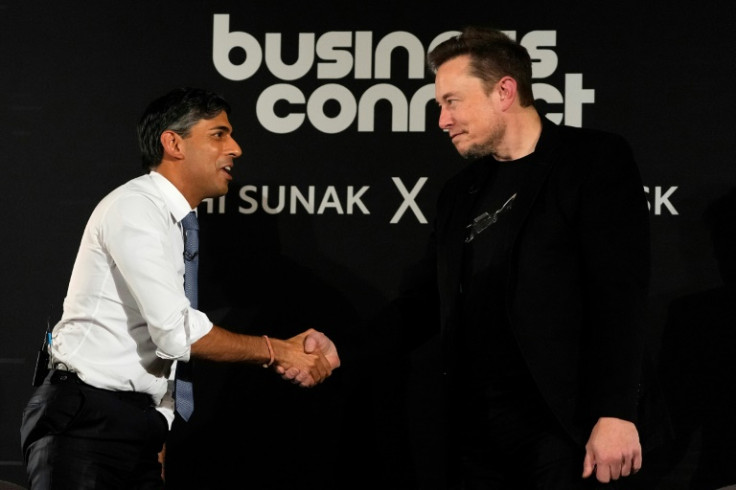AI Will Eventually Replace All Human Jobs, Tech Billionaire Elon Musk Tells UK PM Rish Sunak
According to Musk, there "will come a point where no job is needed", as the billionaire entrepreneur described artificial intelligence as the "most disruptive force in history".

AI will eventually replace all human jobs, tech billionaire Elon Musk told Prime Minister Rishi Sunak yesterday during a 50-minute interview.
The pair met to discuss the future of AI at the end of this week's summit in Bletchley Park.
According to Musk, there "will come a point where no job is needed", as the billionaire entrepreneur described artificial intelligence as the "most disruptive force in history" in a wide-ranging conversation.
Speaking in the lavish Lancaster House in London, the Tesla chief executive and owner of SpaceX and X added that you could still "have a job if you want one for personal satisfaction, but it will no longer be a requirement".
Musk, a long-standing advocate for the development of AI, has put money into AI firms and even employed the technology in his driverless Tesla cars – but he's also on the record about his fears it could threaten society and human existence itself.
Concerns over the rapid development of artificial intelligence systems even prompted Musk to join hundreds of experts in expressing unease at the advancement of powerful AI systems.
In a letter issued by the Future of Life Institute, the growing concerns of AI's advancement were expressed, stating: "They should be developed only once we are confident that their effects will be positive and their risks will be manageable."
Yesterday, he admitted to Sunak that there was undoubtedly a "safety concern" with the technology.
Stressing the necessity for "off switches", Musk agreed on the need for a "referee" to keep an eye on the super-computers of the future.
Before the conference began, two "godfathers" of the technology warned that companies must be held responsible for harm caused by their products.
A document signed by 23 tech experts claimed it was "utterly reckless" to pursue ever more powerful AI systems before understanding how to make them safe.
With this in mind, at the summit this week, eight "frontier" AI companies agreed to share their future models with ten nations and the EU to be tested before release to ensure the software cannot be hijacked by malign forces.
Hailed as a "landmark" voluntary agreement, companies signing the pledge included Sam Altman's OpenAI, Google DeepMind, Anthropic, Amazon, Mistral, Microsoft and Meta.
Speaking at the close of the summit, Sunak said agreements reached with multiple countries and AI companies had significantly reduced the threat posed by the technology.
However, he was forced to defend the voluntary nature of the testing agreement, with his government declining to introduce legislation to rein in AI development.
Explaining that the UK had to move faster than a legislative timetable would allow, he said: "Technology is developing at such a pace that governments have to make sure that we can keep up."
He added that ultimately "binding requirements" would probably be necessary for AI firms.
Asked by Sunak what he thought of the initiative, Musk quipped jokingly that "it will be annoying, that's true" but said he supported the plan.
In front of an audience of leading technologists yesterday, Sunak insisted he would "protect the country" while taking advantage of the potential benefits of AI.
The Prime Minister claimed he wanted Britain to replicate the culture of Silicon Valley, where "people are comfortable giving up the security of a regular paycheck" to start companies, insisting they ought to be "comfortable with failing".
So far, Sunak has supported a fairly tolerant approach to the development of artificial intelligence. In March, the UK government released a White Paper outlining its stance on the technology.
It said that rather than enacting legislation it was preparing to require companies to abide by five "principles" when developing AI.
Individual regulators would then be left to develop rules and practices. But this week, he seemed to adopt a more cautious stance.
Before the summit began, Sunak announced the establishment of a 'world first' UK AI safety institute.
The organisation would aim to "advance the world's knowledge of AI safety".
"It will carefully examine, evaluate and test new types of AI so that we understand what each new model is capable of," Sunak said in a speech at the Royal Society, an association of leading scientists.
The institute would "explore all the risks, from social harms like bias and misinformation through to the most extreme risks of all".
© Copyright IBTimes 2025. All rights reserved.






















